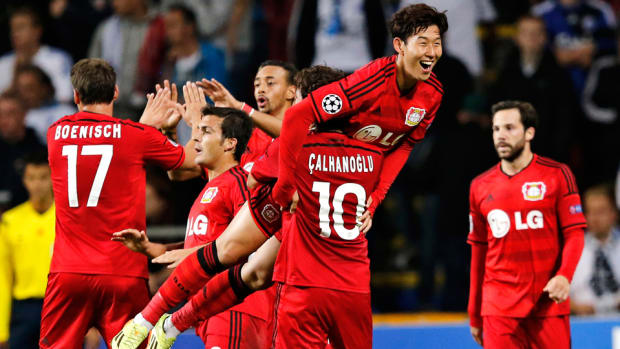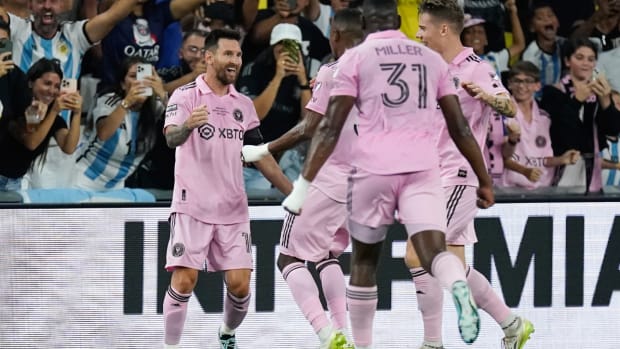Juan Carlos Osorio, Mexico Were a Failed Relationship, Doomed from the Start
Well, he’s out.
After becoming Mexico’s 12th head coach in the span of nine years and the team’s first ever Colombian, Juan Carlos Osorio leaves his post as manager.
Despite half-hearted efforts from the Mexican Football Federation and its new president Yon de Luisa, Osorio turned down a contract renewal, and so came the end of a three-year tenure, where he guided the squad to 33 wins, 10 losses and nine draws.
To put those numbers in perspective in relation to the history of Mexico's men’s national team, out of all the managers who managed at least 20 matches, he secured the second-best record. Only Javier Aguirre topped Osorio’s, but he needed two terms (2001-2002, 2009-2010) in order to achieve it.
This statistic, however, including Osorio’s influence with young and experienced players, his passion for detailed strategy which led to an undefeated World Cup qualifying campaign or the team’s impressive victory against Germany last month in Russia, was never going to be good enough for a nation who never truly accepted him.
Ultimately, his decision to leave El Tri is anything but surprising as Osorio the outsider never felt welcomed and as it usually seems in Mexico, the job was doomed from the start.
First, we must begin with the elephant in the room. It would be naïve to say that not being Mexican was never a factor as it was a continuous theme among many Mexicans. Ex-player and manager Hugo Sanchez, for example, was a major critic of Osorio as his usual theme when depicting his work usually circled around him being Colombian.
“I trust in the talent and quality of the player, but not in the technical team,” Sanchez said in April before the World Cup. “There’s no style, they can be modern or innovative but let him (Osorio) do it with Colombia, not with Mexico.”
There was also a matter of philosophy and what Osorio’s style represented. In simple terms, he was never going to succeed in Mexico because success meant something else to Mexicans.
Osorio wanted stability while Mexico wanted results, no matter the opponent.
Fans also did not appreciate his tinkering approach, where players rotated due to his obsession with formation and design but despite the criticism, Osorio remained stoic and committed to his plan. Much like his mentor Sir Alex Ferguson, the Colombian wanted to build a culture where winning came out of tactical development, which essentially produced quality on the pitch. For him, teaching his players the tactical aspects of the game was just as important as winning and as Jonathan Dos Santos said earlier this year, training with him was like going to school where players ended their days in a video room and Osorio would hold one-on-one sessions dissecting their work in previous matches.
For Osorio, Liga MX was an important place to find and develop Mexican talent but ultimately, it was Europe, where he wanted his players to compete. But what many critics of his work failed to understand was that this preference towards Europe had nothing to do with a distaste of Mexico’s domestic league. It was thanks to Osorio, after all, where young Monterrey players such as Jonathan Gonzalez and Cesar Montes made their senior teams debuts.
But in the end, Mexican fans wanted immediate results as this became the central theme ever since the team’s humiliating 7-0 loss against Chile at the Copa America Centenario. It was a wound that never properly healed, and it seemed as if the only way to fix it was to do the same thing to someone else. But it never happened, so the anxiety kept elevating.
During one particular interview last year, Osorio commented on this pressure to deliver, “they’re not happy with us winning,” said Osorio. “We have to win and humiliate the opposition. There is no country in the world that keeps so much pressure on a national team coach. There is none.”
Despite an almost perfect, undefeated World Cup qualifying campaign, the criticism on Osorio kept building, and by spring of this year, the consensus was that Mexico would struggle in Russia. During El Tri’s 1-0 victory against Scotland in June, for example, Mexican fans chanted “Fuera Osorio!” (Osorio, out!) throughout the game. Just imagine that scenario: It was the team’s sending-off match, a time to bid farewell and good luck as the nation prepared for its seventh consecutive World Cup appearance, and Mexico was asking for its manager’s head.
At the World Cup, Osorio gave Mexico arguably its greatest ever victory with a 1-0 win against Germany, and for a brief, glorious period, Mexicans were happy with their manager. They were the belle of the ball, and Osorio the carriage that brought them there. But once again, the reality crushed the fairy tale and after a dissapointing performance against Sweden in the final match of the group stage, El Tri bowed out of the tournament in the Round of 16 against Brazil. The game ended up as a disappointing conclusion to a tournament that offered so much promise.
"I want to thank all our fans, they're really wonderful," Osorio said after the World Cup. " I want to thank them for their support and love! I apologize to them for our failure to qualify for the next round. I deeply regret this. I think we have the best fans in the world."
Directly after the loss, he was asked on his future and whether he would stay with the team and renew his contract. "We have to allow time for us to heal and process this loss, and in the next few days, the federation will make its decision, and so will I, and you will all know."
In truth, everyone already knew the answer.
As the Mexican federation looks to rebuild its identity under new leadership, while preparing to co-host the World Cup in 2026, conventional wisdom would suggest that the next manager would be either Mexican or an established presence inside Liga MX. Names such as ex-Chivas manager Matias Almeyda and Miguel Herrera come to mind. Another could be Tigres head coach Ricardo “Tuca” Ferretti. The 64-year-old coach signed on as interim manager in 2015 after the aforementioned Herrera was fired but made it clear he only wanted the role on a temporary basis. But seeing as Mexico’s new head of communications is Beatriz Ramos, who used to be VP of communications for Tigres, Ferretti could be swayed once again.
In regards to Juan Carlos Osorio’s future, the USMNT job seems extremely appealing to both parties, given his close relationship with the U.S (he met his wife and both his sons were born in America) and his knowledge of CONCACAF.
But his personal dream has always been to manage Colombia and with the uncertainty of Jose Pekerman’s future, there might not be a better time to take the job.
Wherever he goes, the hope is that supporters recognize and validate his strengths as a manager and understand that results are a product of development. No coach is perfect, but if his relationship with Mexico taught us anything, is that nothing good comes out of pushing someone when they’re trying to get up.




